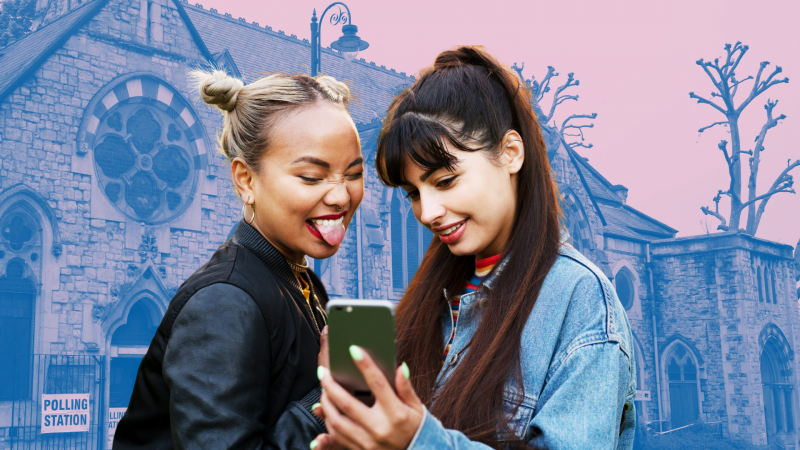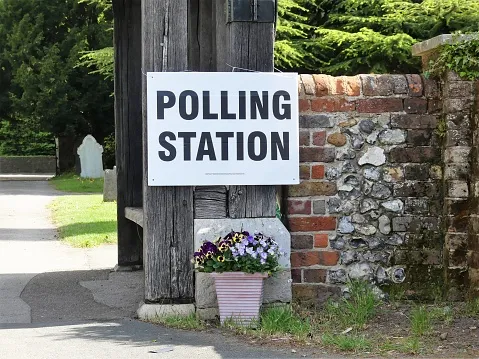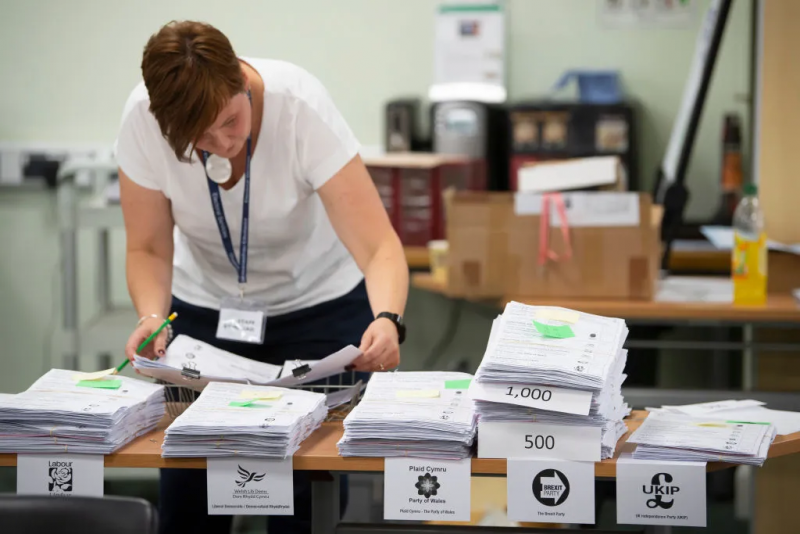
In a world of AI and QR codes, heading to a polling station can feel like stepping back in time.
The setting feels very Vicar of Dibley-esque as the doors of village halls, churches and primary schools across the country are thrown open. With a tiny pencil in hand, you scribble an ‘X’ onto a piece of paper, which is then deposited into a ‘letters to Santa’-style postbox.
There’s rarely an iPhone in sight (the Electoral Commission strongly advises against taking selfies at stations), and the process – perhaps the most integral to a functioning modern society – has remained pretty much unchanged since 1872, when Britain held its first ‘secret’ ballot.
This week, a new crop of voters, born on or before July 4 2006, will be exercising their democratic right for the very first time in the General Election.
For these voters – and other Gen Zs who may never have stepped into a polling booth before – the set up will be at odds with the digitised world they grew up in.
After all, this is the generation who have never heard the sound of dial-up internet, never owned a CD, or lived in a home with a landline telephone.

Amy Lobo is 18 and lives in Portsmouth. She voted for the first time just two months ago in a local election, and found the process to be ‘outdated’.
‘It’s such an archaic system,’ she tells Metro.co.uk. ‘Going physically to a place and having to use a pencil and paper is really a thing of the past when everything’s so online these days.
‘In a modern society, I think the system of voting in person is a little bit out of place.’
Amy thinks that introducing a way of online voting would encourage more young people to take part.

‘I think older people should still be able to vote physically and use the system they know, but we should give more technologically advanced options to young people who perhaps want a more convenient way to vote from their devices.
‘I think for me it would definitely make the process easier not to have to go and talk to someone, but to be able to put in my vote myself online. I would really like that.’
Fellow Gen Z voter, Eliza Lin, 18, from Gosport, agrees. ‘People live busy lives now,’ she says. ‘Jobs vary in hours and people find it hard to get to a polling station.’
Eliza also points out that voting in person is even trickier for those who live in rural locations.
‘Having an anonymous digital service would increase accessibility and may be more favourable to the young. It would be sensible to have two ways to vote so people have the option – similarly to having physical and digital prescriptions.’
She concludes: ‘We shouldn’t scrap the current system – but it should be adapted.’
Some young people also cite feeling nervous about in-person voting – and opt for postal voting instead.
In the 2019 General Election, 21% of all valid votes were postal votes, and the turnout tends to be higher among postal voters than those who go to polling stations.
Ellie Wescott, from Dorset, was one such postal voter in 2019. Then aged 22, she chose not to vote at her polling station due to feelings of anxiety. The younger generation (those aged 16 to 29) are most likely to have some form of anxiety (28% likely) than any other age group.
‘Going in person puts me off voting,’ she tells Metro.co.uk. ‘I don’t like the idea of going somewhere I don’t know, struggling to find the place, queuing up with other people and the formality of it.

‘I feel there’s a lot of pressure, and like I might do something wrong. At the time, it was really anxiety-inducing for me, which is why I chose to postal vote.’
Meanwhile others, such as Amber Alcock, 18, from Derby, are looking forward to how ‘quaint’ voting in person is.
‘This election will be my first time voting,’ she tells Metro.co.uk. ‘I think it’s such a sweet tradition – it’s nice that it’s been going on this way for hundreds of years and I’m looking forward to being part of it.
‘I don’t think I’ve written with a pencil since I was at primary school! I find that aspect bizarre – no one writes anything down anymore, let alone with a pencil.

‘But I don’t really see why we have to go to a polling station when a simple tap on the phone will do.’
So, when we can check in for a flight, get a prescription, apply for a passport – and do pretty much everything else from our phones – why can’t we vote in this way?
Toby James is a professor of Politics and Public Policy at the University of East Anglia. He says voting in person is the best way of ensuring a fair outcome.
‘The security risks of allowing online voting are currently far too high,’ he tells Metro.co.uk. ‘There has been increased evidence of attempts at foreign interference in elections by Russia and other actors around the world. There would be serious attempts to rig the election if it was online. For now at least, the security problems that online voting would introduce far outweigh any increase in turnout.’
Around the world, only Estonia has internet voting for binding national parliamentary elections. ‘This partly reflects that a “Victorian” system works,’ adds Toby. ‘Paper ballots in polling stations might seem “old fashioned” but it ensure that everyone’s vote is secret – and can’t be interfered with. They are, therefore, really effective at ensuring that a voter’s choice is theirs – and theirs alone.’

Dr Mark Garnett, senior politics lecturer at Lancaster University agrees: ‘Piles of paper provide a lasting record of voting preferences which can be checked if a result is contested. There is a much greater risk of Interference in a digital process – especially by a hostile foreign state – and inquiries into individual accounts would be far more protracted.’
He also suggests the voting in person weeds out those who aren’t particularly concerned by the result. ‘The sheer inconvenience of voting in person with a pencil chimes in with the view that political participation shows commitment to the system,’ he adds.
There are, however, some digital ‘upgrades’ that could improve the way we cast our votes.
Toby says: ‘It is worth adding that digital technology has been trialled more recently in Wales. There have been pilots of using digital versions of the electoral register which means that people could vote at any polling station. At the moment, citizens are required to vote in the specific polling station located on their poll card. This is somewhat dated and out of line with modern living styles.
‘Internet voting has been used in many countries to allow overseas electors to vote. They are currently required to vote via post – and the reality is that postal votes don’t make it back in time from Australia, the USA and elsewhere. Many overseas electors will not have their vote counted as a result. Emailing scans of ballot papers could really help to solve this situation.
‘It is also important to note that there has been a “quiet revolution” over the past twenty years towards postal voting. Roughly 20% of votes have been postal votes at the last three general elections. One in five people therefore participate without stepping foot in a polling station.’
Do you have a story to share?
Get in touch by emailing MetroLifestyleTeam@Metro.co.uk.
Sign up to our guide to what’s on in London, trusted reviews, brilliant offers and competitions. London’s best bits in your inbox
Disclaimer: The copyright of this article belongs to the original author. Reposting this article is solely for the purpose of information dissemination and does not constitute any investment advice. If there is any infringement, please contact us immediately. We will make corrections or deletions as necessary. Thank you.




